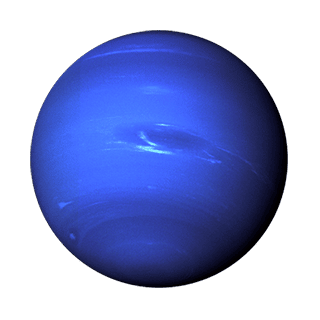
Neptune Astrology Facts:
| Glyph: |
|
| Ruler of: | Dreams, Illusion, Mysticism |
| Named for: | Neptune, the Roman God of the Sea |
| Sign of Dignity: | Pisces |
| Sign of Detriment: | Virgo |
| Sign of Exaltation: | Leo |
| Sign of Fall: | Aquarius |
| Physical Body: | Pineal gland, psychic healing |
| Changes Sign: | Every 10-12 years |
What Does Neptune Mean in Astrology?
Ruler of illusion and the subconscious, mysterious Neptune is the only planet that cannot be seen from Earth with the naked eye. Neptune reminds us of the power of the unseen in the Universe and within ourselves, influencing intuition, dreams, your connection with your soul and spirit, and your soul’s connection with the Universe.
Icy blue in color and even icier in temperature, the coldest planet in our solar system, was named for the Roman God of the Sea. Like the sea, Neptune represents the subtle yet powerful secrets that lie beyond “the boundaries that keep the soul separate from the whole” of the Universe, as astrologer Judy Hall explains.
Neptune takes 10-12 years to move through a single sign and about 165 years to orbit the Sun.
Like his immediate neighbors, Uranus and Pluto, Neptune is considered a generational planet. These three planets are often referred to as the modern planets or Trans-Saturnians.
Since these three planets move slower and are much further from the Sun, the influence of generational planets is known to impact generations as a whole.
Interestingly, since Neptune wasn’t discovered until 1846, we have yet to understand its influence to the same extent as we do with the planets that come before Saturn. This is because, since its discovery, Neptune has yet to travel through all 12 zodiac signs.
That said, if you look at Neptune’s transits over the last four or five generations, you’ll definitely notice a shift in overall attitudes towards the spiritual, the mystic and mysterious, and escapism.
- For example, from 1958-1969, Neptune was in the emotional, intense Water sign of Scorpio. This time period saw a surge in spirituality, sexuality, and drug use. Coincidence? Probably not.
Your Neptune Sign
Neptune is the gatekeeper of the subconscious boundary within the individual Self, influencing your ability (or inability) to access or be “in tune” with your subconscious.
Whether one is prone to methods of escapism (like consciousness-altering substances) is indicated by Neptune’s placement in the natal chart. If you find yourself often lost in vivid daydreams and idealistic imaginings that pull you deeper into your dream life and out of the physical world around you, chances are that this planet exerts a particularly strong pull over you (or your generation).
- Fire signs are dramatic, imaginative, creatively intelligent, idealistic, and seek spiritual truth over religion. They are forceful, and that power manifests their goals into reality.
- Air signs are resourceful, highly intellectual, hypnotically communicative, and idealistically humanitarian. They are prone to deception and can confuse ideals for rational thought.
- Earth signs use mysticism and imagination practically, crave balance and harmony, aspire to goals for the greater good, and often believe the end justifies the means. They can fall prey to materialistic delusions.
- Water signs are emotionally intense and sensitive and work towards a collapse of personal power into spiritual power—a merging of soul and source. Water Neptunes are most prone to escapism because they have difficulty distinguishing escapism from spirituality.
Neptune Retrograde
A retrograde is a period of time where it appears as if a planet is moving backward from where we see it on Earth.
During Neptune retrograde, which happens once a year, we have a deeper connection to our spiritual side, intuition, and artistic abilities.
However, be careful not to get lost in escapism or fantasy. Be sure to remain balanced while growing spiritually.
This is a great time to tap into your intuition and focus on your spiritual pursuits, ideas, and needs.
Symbol
The three prongs making up Neptune’s glyph, or symbol, symbolize the unconscious mind, the conscious mind of “everyday awareness,” and cosmic consciousness.
